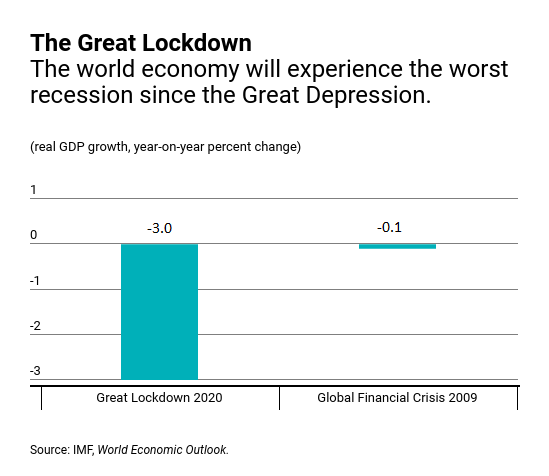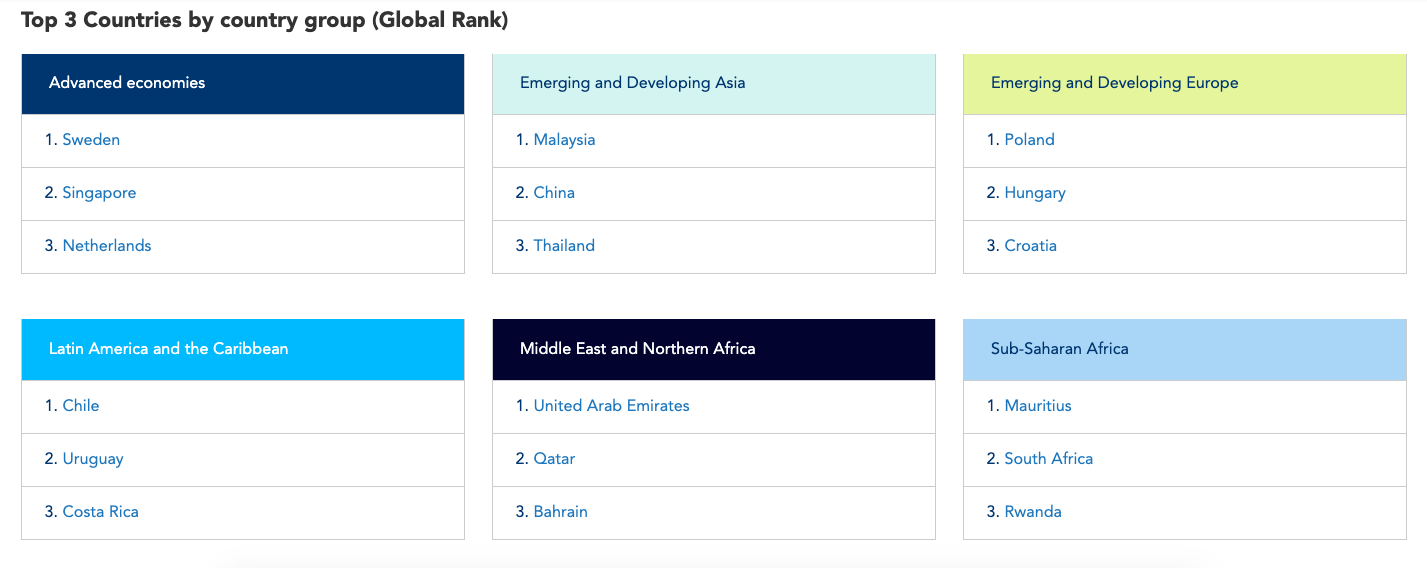During the week of April 13th, the International Monetary Fund (IMF) hosted its 2020 Spring Meetings (Virtual). Released on that occasion, the World Economic Outlook (WEO) report underlines that we are facing a crisis like no other.
To face the current multi-layered, global COVID pandemic crisis, the report offers four policy proposals for international institutions, governments, and domestic and multinational firms alike. Priority is granted to health spending, targeted fiscal measures, reducing stress to the financial system, and implementing strong global recovery plans. Across these recommendations, a common theme emerges the collective and individual readiness of various core infrastructure systems, including technology, innovation, and skills. Readiness – the ability to access, purposefully use, and benefit from something – is more critical than ever before.
 According to the IMF’s “baseline” scenario – that is, if the COVID-19 pandemic fades in the second half of 2020 – the global economy is projected to contract by -3% in 2020, with a -11.0% contraction in world trade volume. The modest economic recovery rate of 5.8% projected for 2021 is contingent on increasingly volatile factors, from fiscal support measures to the very epidemiology of COVID-19. Additionally, GDP levels for 2021 are projected to remain below the pre-virus trend. By this measure, the IMF anticipates the worst economic fallout since the Great Depression. This year alone, 170 IMF member countries should expect to experience negative per capita income growth.
According to the IMF’s “baseline” scenario – that is, if the COVID-19 pandemic fades in the second half of 2020 – the global economy is projected to contract by -3% in 2020, with a -11.0% contraction in world trade volume. The modest economic recovery rate of 5.8% projected for 2021 is contingent on increasingly volatile factors, from fiscal support measures to the very epidemiology of COVID-19. Additionally, GDP levels for 2021 are projected to remain below the pre-virus trend. By this measure, the IMF anticipates the worst economic fallout since the Great Depression. This year alone, 170 IMF member countries should expect to experience negative per capita income growth.
For advanced economies, a -6.1% contraction is expected for 2020, before a 4.5% growth in 2021. The impact anticipated for emerging and developing economies (-1.0% contraction in 2020, with a 6.6% growth in 2021) is deceptively optimistic.
As the WEO report emphasizes, low-income nations should be considered high-risk. With weaker health systems and fewer resources than advanced economies to begin with, the pandemic crisis will disproportionately impact these economies’ lives and livelihoods. In the past two months alone, portfolio outflows from emerging markets stood at around $100 billion: a figure three times larger than the comparable measure in the 2008 financial crisis. As emerging markets face health shocks and economic disruptions, the remittance economy is expected to contract significantly.
The first economies affected by the pandemic crisis have showcased the global ripple effects of impacted sectors, among which hospitality, transport, tourism, entertainment, and retail are the most negatively impacted due to a collapse in demand and commodity prices. While countries that have flattened the curve eagerly anticipate a return to normalcy, the WEO report urges sober realism. As it stands, the projected consequences of the crisis are best-case estimations. The duration and intensity of the shock remain unknown.
 Recovery will require strong multilateral coordination to mitigate some of the long-term scarring effects on the global economy. This effort should include, coordinated debt relief, targeted financial stimuli, and accommodative monetary policy agendas. Not to mention the coordinated reinforcement of healthcare systems and technology around the world that will be key. To this end, the WEO report stresses the importance of solidarity and support. That we should keep the ladder up. “Those with greater resources and policy space will need to do more; others with limited resources will need more support.”
Recovery will require strong multilateral coordination to mitigate some of the long-term scarring effects on the global economy. This effort should include, coordinated debt relief, targeted financial stimuli, and accommodative monetary policy agendas. Not to mention the coordinated reinforcement of healthcare systems and technology around the world that will be key. To this end, the WEO report stresses the importance of solidarity and support. That we should keep the ladder up. “Those with greater resources and policy space will need to do more; others with limited resources will need more support.”
A key aspect of multilateral recovery identified by the WEO report is readiness. To prevent and prepare for another global crisis akin to the COVID-19 pandemic, the IMF stresses the need for: reinforcement of healthcare systems, automated information exchanges, and the use of digital technologies to deliver targeted support to affected individuals and groups, particularly to provide relief for individuals working in the informal sector in emerging markets. The WEO report stresses the importance of these technologies to keep the economic and financial infrastructure of society intact.
The Network Readiness Index (NRI), developed by Portulans Institute, addresses future readiness by benchmarking the network economy in terms of technology, people, governance, and impact. The 2019 report found that high-performing countries are those that invest in a supportive ecosystem for digital leadership, including all key stakeholders. Technology is at the heart of the digital network economy. And network readiness is critical for building global resilience and weathering a global crisis like no other.
The NRI’s assessment helps us gauge the levels of readiness and preparedness of both advanced and emerging economies. Faced with rising cases, some of the highest-ranking countries for 2019 – Singapore and the Netherlands – have responded with digitally-integrated solutions rooted in good governance and competent leadership. On the other hand, the lowest-ranking countries with weak network capacity are comparably less prepared for the health and financial shocks of the pandemic. Weathering the storm of COVID-19 demands capable governance, strong leadership, and the capable integration of digital technologies into containment, stabilization, and recovery efforts. Network ready economies have demonstrated their capacity to respond quicker, and in the longer term, may suffer less in lives and livelihood. As the WEO stresses, high-risk economies are those with fewer resources to commit to readiness. The NRI’s lowest-ranking countries, the bottom ten of which are in Sub-Saharan Africa, may suffer more.
On a global scale, the COVID-19 crisis has underlined the importance of digital technologies in containment, stabilization, and recovery efforts. For some firms, the transition to a work-from-home online environment has necessitated rapid digital transformations. For some governments, digital technologies have been mobilized to provide income support and financial relief to impacted individuals and communities. For international health organizations, the slow global response to the pandemic has spurred the improvement of information systems technologies for automatic information exchanges to bolster readiness. For the IMF, social media platforms enable global access to IMF expertise on the pandemic crisis, such as on YouTube (the IMF Institute Learning Channel). And for the nearly three billion individuals in lockdown across the world, online platforms are more important than ever for easing communication, sharing news, and – perhaps of equal importance – creating a sense of global solidarity.
But international NGOs alert that almost half of the global population don’t have meaningful internet access. Thus, they don’t have access to critical health information, advice, and emerging digital health services, are barred from online working, and learning from home is not an option. The digital divide is still very much with us and needs to be tackled as a matter of collective survival and solidarity.
IMF Chief Economist and Director of Research Gita Gopinath’s foreword to the WEO report contains much-needed optimism. While the pandemic crisis is nothing short of a test of humanity and resilience, “it is this common threat that brings us all together, to harness the greatest strengths of our humanity – solidarity, courage, creativity, and compassion. We don’t know yet how our economies and way of life will change, but we do know that we will come out of this crisis more resilient”.
By Carolina Rossini, Co-Founder and CEO.




